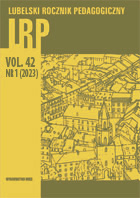THE IMPORTANCE OF FAMILIES OF MINORS IN THE REHABILITATION WORK OF EDUCATORS –
AN INTERACTIVE PERSPECTIVE
THE IMPORTANCE OF FAMILIES OF MINORS IN THE REHABILITATION WORK OF EDUCATORS –
AN INTERACTIVE PERSPECTIVE
Author(s): Gabriela Dobińska, Katarzyna MiśkiewiczSubject(s): Family and social welfare, Sociology of Education, Pedagogy
Published by: Wydawnictwo Naukowe Uniwersytetu Marii Curie-Sklodowskiej
Keywords: family environment; minor; educator; family probation officer; educational measures;
Summary/Abstract: Introduction: The paper focuses on the work of pedagogues (educators of youth educational centers and family probation officers), who work with families of minors.Research Aim: The aim of the article is to describe the types of social rehabilitation educators and the significance that pedagogues attribute to their relations with the families of minors as part of strengthening social rehabilitation activities.Method: The collected empirical material comes from interviews and observations of the everyday professional lives of educators from educational centers and family probation officers. The proce- dures of grounded methodology determined the method of analyzing the collected data, creating conditions for the generation of patterns which shaped the activities performed by the educators. The theoretical framework is determined by the assumptions of symbolic interactionism. Results: We will present a typology of educators and strategies used by them in contacts with families of minors in an open and closed environment. We have highlighted the extreme strat- egies applied by educators in their work with families of juveniles, i.e. active and passive strate- gies, and within this framework we selected the tactics used by the respondents.Conclusions: We managed to find out that despite the variety of environments in which edu- cators of youth educational centers and family probation officers work, they reached for similar activities aimed at establishing and managing a relationship with the families of minors. Fur- thermore, we compared our analyses with the proposed characteristics of models of working with families. Finally, we took note of the fact that while the respondents implemented all work models, the professional-directed and family-allied models dominated.
Journal: Lubelski Rocznik Pedagogiczny
- Issue Year: 42/2023
- Issue No: 1
- Page Range: 177-194
- Page Count: 18
- Language: English

